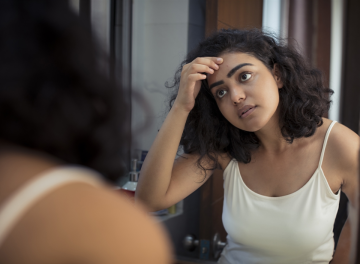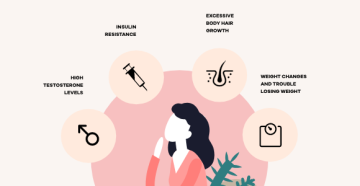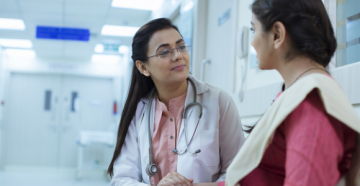What is PCOS?


Is that excess hair growth on your face or the darkened skin on your neck stressing you out?
Well, you could be suffering from Polycystic Ovary Syndrome (PCOS). So, what does PCOS mean? It is a hormonal condition that affects women of the reproductive age. PCOS in women makes the body produce a higher-than-normal amount of androgen, the male hormones.PCOS in women causes male type baldness as well as more than usual hair growth on the face and body. It can also contribute to long-term health problems like type 2 diabetes and heart disease.
The first signs of PCOS to look out for are irregular periods, facial hair due to excess androgen, and polycystic ovaries.If you see yourself facing at least 2 of these indications, you may be diagnosed with PCOS. It is best that you consult a doctor if you see yourself facing any of these symptoms.
Reasons for PCOS?
Now that we know what PCOS means, we must next try looking for the reasons you may develop these indications. According to the doctors, the exact cause of PCOS in women is not entirely known. In part, one of the major reasons is determined by your genes. Other reasons for PCOS that might be at play include:
Excess insulin
Produced in the pancreas, this hormone controls how the food you eat is transformed into energy, but if your cells resist the action of insulin, your blood sugar levels can increase, making your body produce more insulin.High levels of insulin can increase androgen production. In turn, higher androgen levels can prevent the ovaries from releasing an egg during each period, causing extra hair growth and acne, two sure signs of PCOS in women.
Low-grade inflammation
The production of white blood cells to fight infection is known as low-grade inflammation. PCOS in women display a type of low-grade inflammation that triggers polycystic ovaries to produce androgens, which in the long run can lead to heart and blood vessel problems.
Symptoms of PCOS

Some of the symptoms of PCOS in women may overlap with other health conditions, but it’s important you pay attention to the signs that may indicate PCOS, the most common being missed, irregular, or prolonged periods - you may frequently miss periods or have fewer periods or may get them every 21 days. Other symptoms include:
- Darkening of skin on the neck, in the armpits, and the groin area
- Pelvic pain and obesity
- Acne and hair growth on face and chin due to high levels of androgen. Facial hair growth is known as hirsutism in medical terms and affects almost 70 percent of women with PCOS
- Hair thinning or hair loss on the scalp (male pattern baldness)
- Difficulty shedding weight
Who gets PCOS?
After learning about what PCOS means, you should know that although common, about 5 to 10 percent of women between ages 15 and 44, or during the childbearing years, have PCOS. It’s in their 20s and 30s that most women find out they have PCOS. But, PCOS in women can happen at any age after puberty. Obesity increases the risk of PCOS, genetics playing a bigger role though.
How to cure PCOS?

Your fundamental question is going to be – is PCOS curable or how to cure PCOS permanently? You must see a doctor if you have irregular periods, have excessive acne or hair growth, or are having trouble conceiving. Introducing healthy changes in your lifestyle is key. If you’re overweight, it’ll help to lose a little weight; increasing physical activities can reduce your risk for type 2 diabetes and prevent other health problems. Some medicines prescribed by your doctor can help you ovulate, as well as reduce acne and the excess unwanted hair growth. Your treatment will depend on your symptoms, age, and whether you want to get pregnant. However, there are some treatment options for PCOS you could investigate but make sure to discuss your treatment plan with your doctor too and get on with life as always. There is always a cure, but you must act on time!





